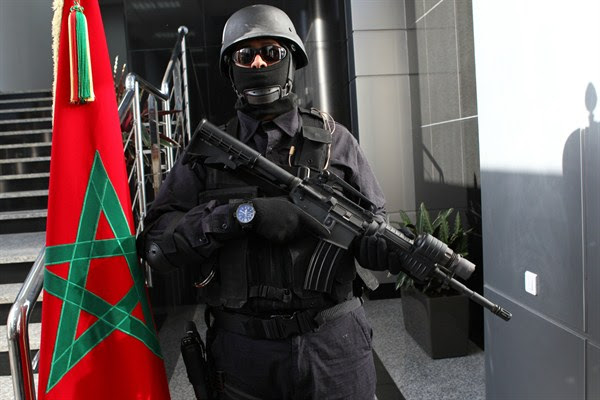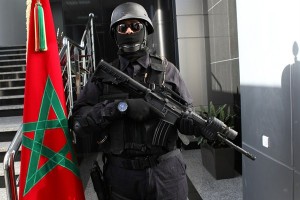Karina Piser
(AP photo by Abdeljalil Bounhar)
A member of the Moroccan special anti-terror unit at the headquarters of the Central Bureau of Judicial Investigations, Rabat, Morocco, April 20, 2015 (AP photo by Abdeljalil Bounhar).
Last week, the Long War Journal reported that the“self-proclaimed head of the Islamic State’s arm in the Sahara has reportedly threatened to attack Morocco,” according to an audio statement sent to Al Jazeera. The message’s authenticity has not been verified, and there has been no official media release of the tape. But it drew attention to the potential terror threats facing Morocco, which has for years taken pride in its domestic anti-radicalization programs and has emerged as an important counterterrorism partner for European countries, including France and Belgium. In 2014, the leader of the Islamic State (ISIS), Abu Bakr al-Baghdadi, made a similar threat against Morocco.
The recording’s validity aside, the article poses important questions about the existence of the Islamic State’s “Sahara arm,” which analysts such as Geoff Porter, of North Africa Risk Consulting and the United States Military Academy at West Point, quickly discounted on Twitter: “Morocco does have an ISIS problem,” he wrote, “but saying ISIS has a Western Sahara branch is not accurate.”
For Vish Sakthivel, an adjunct fellow at the Washington Institute for Near East Policy and a doctoral student the University of Oxford, the notion of a Sahara branch “raises the perennial question of ‘who is ISIS?’” The group’s deepening foothold in Libya, for example, has been well-documented, with regular Western strikes on training camps for the estimated 6,000 fighters there. Small but not insignificant numbers of U.S. Special Operation troops have also been stationed in Libya since late 2015.
An established Islamic State presence, however, is “less the case in the Sahara,” says Sakthivel. Members of smaller terrorist groups such as the Movement for Oneness and Jihad in West Africa (MUJAO) “have tended toward al-Qaida, other than a few defections.”
Yet the terrorist landscape in West Africa, the Sahara and the Sahel is murky and hard to parse, making it extremely difficult to determine the weight of affiliations or alleged pledges of allegiance. Many networks are multinational, which isn’t surprising due to the region’s porous borders. As far as the Islamic State’s ground there, Sakthivel explains, “a whole ‘branch’ would take time to develop—but if the recording is authentic, Morocco, the United Nations and the Western Sahara should remain vigilant.”
How vulnerable, then, is Morocco to the Islamic State? While exposed to threats both from al-Qaida in the Islamic Maghreb (AQIM) and domestic radicalization, Morocco has seemed insulated from the group’s growing presence in Libya and neighboring Tunisia, which has suffered numerous attacks over the past year. But the much-publicized leaks obtained by German intelligence and the British media in March, detailing the alleged identities of ISIS fighters, indicated that a sizeable number of Moroccans were among the group’s ranks in Syria and Iraq. Although there is some speculation about the documents’ accuracy, Moroccan security officials have said that at least 1,500 citizens have left to fight in Syria and Iraq. And that doesn’t even account for Libya, still a top destination for Moroccan jihadis.
The Moroccan government turns a blind eye to foreign fighters, in large part due to its “desire to get rid of them”—a short-term and flawed fix to homegrown radicalism.
“It’s true that an exceedingly high number of Moroccans comprise ISIS ranks,” Sakthivel says, even though the country boasts of its “domestic efforts to counter violent extremism, such as educational programs promoting moderation and religious tolerance.” Indeed, Morocco has made a name for itself as a hub for training imams; last year, French President Francois Hollande and Moroccan King Mohammed VI signed an initiative to send French imams to a center in Rabat as part of France’s heightened efforts against radicalization.
But despite Morocco’s touted efforts, “there haven’t been many impact evaluation reports, or any record of how, if at all, the measures have worked to curb internal radicalization,” Sakthivel notes, stressing the difficulty of identifying the drivers of radicalization. Furthermore, she adds, a lot of these anti-radicalization programs are “intentionally vague in their wording, so while we see them on paper and in ‘ribbon-cutting’ inaugurations, one is hard-pressed to find the details of the projects.” Still, the Moroccan government’s projection of a so-called moderate version of Islam could spark the ire of extremists.
And as Morocco builds an increasingly robust infrastructure for its Islamic diplomacy initiatives, including training religious figures from Mali and Guinea to France and Russia, it hasn’t quite matched those efforts in its fight against domestic radicalization. According to Mohammed Masbah, an analyst who has conducted extensive research on Morocco’s foreign fighters, “inaction bordering on tacit encouragement displayed by the Moroccan authorities constituted an important push factor that facilitated the travel of jihadis.” That blind eye, he explains, is in large part due to the government’s “desire to get rid of them”—a short-term and flawed fix to homegrown radicalism that brushes aside grievances that drive radicalization. Jihadis on Rabat’s radar who return home are immediately jailed, with little follow-up.
But that isn’t to say that Morocco has completely ignored mounting threats from the Islamic State, having reportedly dismantled numerous cells this year. On Friday, the government announced the arrest of a militant from Chad charged with setting up cells of Algerian and Moroccan fighters.
Still, Sakthivel says that AQIM, coupled with domestic radicalization, remain the “biggest threats” to Morocco—more so than an attack by the Islamic State. And while the possibility of such an event shouldn’t be discounted, the country has a “vested interest in inflating the threat of terrorism to their soil” as a mechanism for receiving foreign military aid, repressing dissent and “positioning themselves as an indispensable ally to the EU and United States.” That puts Morocco’s official claims about its counterterrorism successes in a different light.
Karina Piser is an associate editor at World Politics Review.








